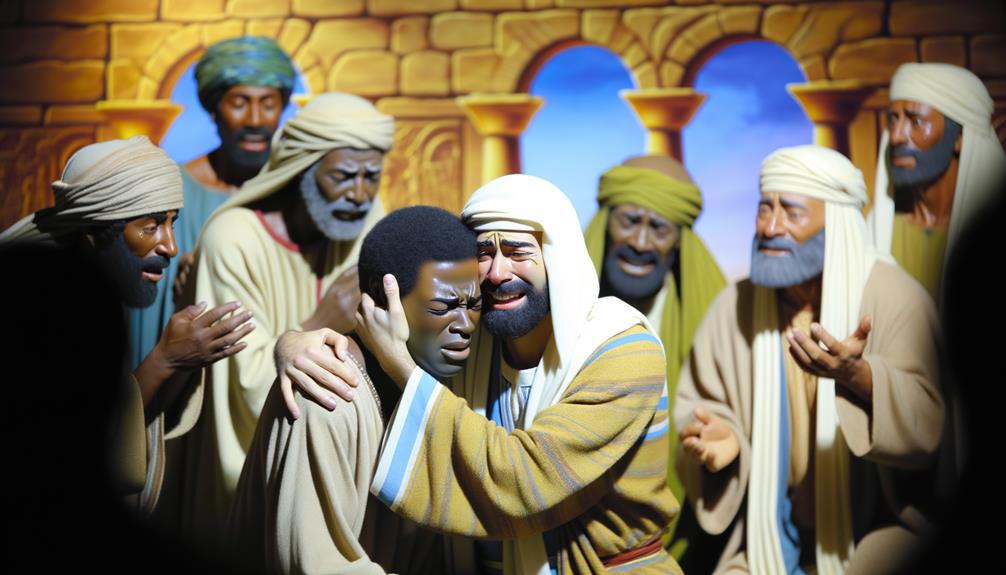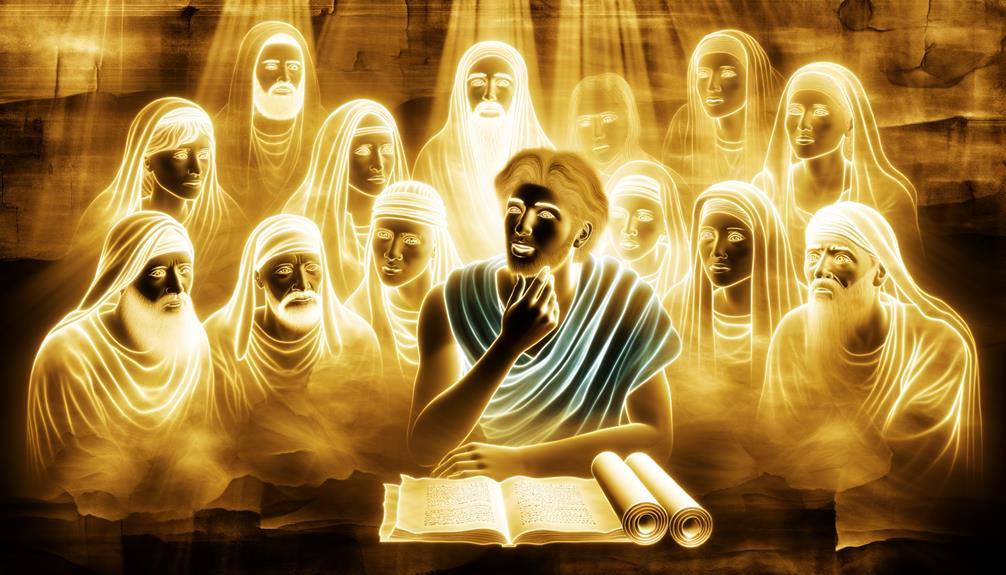Joseph Meaning in Bible Verse: A Dreamer’s Destiny
In biblical scripture, Joseph’s narrative conveys profound theological themes, including divine providence, resilience in adversity, and the power of forgiveness. As Jacob’s favored son, he endures immense trials, from betrayal and slavery to false imprisonment.
His faith remains steadfast, exemplified through his God-given ability to interpret dreams, which elevates him to a position of considerable influence in Egypt. Joseph’s story underscores the intersection of human suffering with divine purpose, ultimately leading to reconciliation and salvation.
Through its rich symbolism and lessons, this narrative offers enduring spiritual insights and encourages further exploration into its deeper meanings.

Joseph Meaning in the Bible: Symbol of God’s Provision and Leadership
| Aspect | Details |
|---|---|
| Name Meaning | Joseph is of Hebrew origin, meaning “God will add” or “He will increase.” |
| Biblical Figures | Two prominent Josephs: Joseph, the son of Jacob (Genesis), and Joseph, the earthly father of Jesus (New Testament). |
| Joseph in Genesis | Known for his dreams, faithfulness, and rise to leadership in Egypt, symbolizing God’s providence and plans for good. |
| Joseph in the New Testament | The earthly father of Jesus, symbolizing obedience, humility, and protection of God’s promise. |
| Spiritual Significance | Represents faith, resilience, trust in God’s timing, and leadership under divine guidance. |
| Key Themes | God’s provision, forgiveness, patience, and fulfilling promises. |
| Message for Believers | Encourages faith in God’s plan, even during hardships, and trust in His provision and guidance. |
Joseph’s Early Life

Joseph’s early life, as depicted in the Bible, is marked by his favored status among his father’s sons and the resulting familial tensions.
As the eleventh son of Jacob, born to his beloved wife Rachel, Joseph was bestowed with a richly ornamented robe, symbolizing his father’s preferential treatment. This favoritism, however, incited profound jealousy and animosity among his brothers, exacerbating existing sibling rivalries.
Such dynamics are significant in understanding the complexities of familial relationships in biblical narratives. The envy and resentment culminated in his brothers’ drastic decision to sell Joseph into slavery, an act that underscores the severe consequences of favoritism and intra-family discord.
These elements set the stage for Joseph’s eventual trials and triumphs, reflecting broader theological themes.
Dreams and Destiny

The narrative of familial discord seamlessly shifts as the dreams bestowed upon Joseph emerge not merely as nocturnal visions but as prophetic revelations that shape his destiny.
In the biblical account, Joseph’s dreams, wherein symbols such as sheaves and celestial bodies bow to him, signify his eventual rise to prominence. These dreams act as divine communication, forecasting his future authority and pivotal role within the socio-political landscape of Egypt.
The interpretation of these visions reveals an intricate plan, suggesting that Joseph’s path is intricately woven into a divine blueprint. His ability to perceive and understand these dreams underscores his unique spiritual insight, affirming that his destiny is intricately linked with divine providence, setting the stage for his remarkable journey.
Trials and Tribulations

The narrative of Joseph in the Bible epitomizes endurance through adversity, as he faced enslavement and imprisonment yet remained steadfast.
His unwavering faith amidst challenges underscores the spiritual fortitude required to navigate profound trials.
Ultimately, Joseph’s triumph over hardships illustrates a divine orchestration of events, culminating in his rise to prominence and fulfillment of prophetic dreams.
Endurance Through Adversity
Throughout the biblical narrative, Joseph’s journey exemplifies the profound resilience and faith required to endure the multifaceted adversities of life.
Sold into slavery by his brothers, unjustly imprisoned, and forgotten by those he helped, Joseph’s experiences highlight an extraordinary capacity for endurance.
His unwavering steadfastness in the face of severe trials underscores the importance of maintaining integrity and perseverance.
Each phase of Joseph’s life, marked by suffering and injustice, serves as a reflection of the human spirit‘s ability to overcome profound challenges.
The narrative invites readers to reflect on the virtues of patience and fortitude, demonstrating that adversity, though formidable, can be surmounted through inner strength and unwavering determination.
Joseph’s story remains a timeless beacon of hope and endurance.
Faith Amidst Challenges
Steering through the tumultuous landscape of trials and tribulations, Joseph’s unwavering faith serves as a demonstration to the power of spiritual resilience and trust in divine providence. His journey, marred by profound adversities, underscores several key aspects:
- Betrayal by his brothers – Joseph’s own kin sold him into slavery, yet he maintained faith.
- False accusations – Despite being wrongfully accused by Potiphar’s wife, he trusted in God.
- Imprisonment – Even in the depths of a prison cell, Joseph’s faith did not waver.
- Unfulfilled promises – When the cupbearer forgot him, Joseph still believed in God’s timing.
This steadfast faith amidst relentless challenges exemplifies an extraordinary spiritual fortitude, serving as an enduring lesson for believers.
Triumph Over Hardships
Joseph’s unwavering faith in the face of severe adversities paved the way for his ultimate triumph over the myriad hardships he encountered.
His journey from being sold into slavery by his own brothers to rising as the vizier of Egypt exemplifies resilience and divine providence.
The narrative underscores that Joseph’s trials were not mere misfortunes but pivotal moments orchestrated for a greater purpose.
His ability to interpret dreams, a gift from God, became instrumental in steering Egypt through a severe famine, thereby saving countless lives.
Joseph’s story illuminates the theological principle that faith and perseverance amid tribulations can lead to profound transformation and redemption.
This biblical account serves as an enduring reflection of the power of enduring faith and divine intervention.
Rise to Power

Joseph’s meteoric ascent to power in Egypt is intricately linked to his extraordinary ability to interpret dreams, a divine gift that not only secured his release from prison but also earned him the favor of Pharaoh.
This pivotal moment underscores the transformative impact of Joseph’s spiritual insight and wisdom, culminating in his appointment as the second most powerful man in Egypt.
Analyzing these events reveals the profound theological and socio-political implications of Joseph’s rise within the biblical narrative.
Dreams and Interpretations
The narrative arc of Joseph in the Bible profoundly illustrates how his ability to interpret dreams catalyzed his ascendancy from a prisoner to the vizier of Egypt.
Joseph’s journey underscores several key moments:
- Imprisonment: Falsely accused, Joseph’s incarceration seemed to signify the end of his aspirations.
- Divine Gift: His accurate interpretations of the dreams of Pharaoh’s butler and baker demonstrated his unique, God-given gift.
- Recognition: Pharaoh’s troubling dreams about seven years of plenty followed by seven years of famine brought Joseph to the forefront.
- Strategic Insight: Joseph’s sagacious plan to store surplus grain during the years of abundance showcased his prudent leadership.
Through these stages, Joseph’s dream interpretations were pivotal, showcasing divine providence and human resilience.
Pharaoh’s Favor Gained
Recognizing Joseph’s extraordinary ability to decipher dreams and his strategic acumen, Pharaoh elevated him to a position of immense authority, effectively making him the second most powerful man in Egypt. This pivotal promotion not only altered Joseph’s personal life but also had far-reaching implications for the socio-economic stability of Egypt. Joseph’s interpretation of Pharaoh’s dreams and his subsequent management of the impending famine demonstrated unparalleled wisdom and foresight.
| Aspect | Significance |
|---|---|
| Dreams | Predicted seven years of abundance followed by seven years of famine |
| Strategy | Implemented a food storage system |
| Authority | Managed Egypt’s resources, saving countless lives |
Joseph’s rise exemplifies the profound impact of divine insight and judicious governance, underscoring the biblical theme of providence and wisdom. His ability to interpret dreams not only elevates him to a position of power in Egypt but also serves as a testament to the necessity of spiritual discernment in leadership. This narrative intertwines with the broader biblical message that challenges believers to seek wisdom and guidance from a higher source in times of uncertainty. In light of these themes, one can explore how Joshua’s biblical significance explained offers further insights into the qualities of leadership and faith that resonate throughout scripture.
Acts of Forgiveness

In the biblical narrative, acts of forgiveness are profoundly exemplified through Joseph’s interactions with his brothers, showcasing a transformative journey from betrayal to reconciliation.
Joseph’s ability to forgive is illuminated by several pivotal moments:
- Recognition without Revenge: Upon seeing his brothers, Joseph refrains from immediate retribution.
- Emotional Restraint: Joseph’s weeping in private highlights his internal struggle and compassion.
- Provision of Sustenance: Instead of withholding resources, Joseph supplies his brothers with grain during famine.
- Revelation and Reconciliation: Joseph reveals his identity, offering forgiveness and inviting his family to live in Egypt.
These acts underscore the profound emotional and spiritual depth of forgiveness, serving as a cornerstone for understanding the redemptive power within human relationships.
Symbolism in Joseph’s Story

Embedded within Joseph’s narrative are rich layers of symbolism that illuminate broader theological and moral themes central to the biblical text.
Joseph’s coat of many colors, for instance, signifies divine favor and uniqueness, setting him apart from his brothers.
His journey from a pit to Potiphar’s house and ultimately to Pharaoh’s court represents the archetypal path of suffering leading to exaltation, mirroring redemptive themes found throughout scripture.
In addition, Joseph’s ability to interpret dreams symbolizes divine wisdom and foresight, suggesting a deeper connection with God’s providential plan.
His story also serves as an allegory for the nation of Israel itself—enduring hardship, yet ultimately finding redemption and blessing.
These symbolic elements collectively underscore key biblical motifs of faith, perseverance, and divine guidance.
Lessons for Modern Believers

Drawing from the rich tapestry of Joseph’s narrative, modern believers can extract profound lessons on resilience, divine providence, and the transformative power of faith.
Joseph’s journey, marked by betrayal, imprisonment, and eventual ascension to power in Egypt, serves as a timeless example to the following principles:
- Resilience in Adversity: Joseph’s ability to maintain faith amidst trials exemplifies unwavering resilience.
- Divine Timing: His rise to power underscores the importance of trusting in God’s perfect timing.
- Forgiveness: By forgiving his brothers, Joseph highlights the healing power of forgiveness.
- Purpose in Suffering: Joseph’s hardships ultimately positioned him to save many lives, illustrating that suffering can have a greater purpose.
These lessons, deeply embedded in his story, offer invaluable guidance for contemporary spiritual journeys.
Conclusion
The story of Joseph, marked by coincidence and divine orchestration, serves as a profound narrative within the biblical text.
His journey from favored son to a figure of immense power and forgiveness encapsulates themes of resilience and destiny.
Joseph’s life, intertwined with dreams and significant trials, ultimately leads to the salvation of many.
This rich tapestry of events offers timeless lessons and symbolisms, resonating deeply with modern believers and inviting continuous scholarly exploration.






